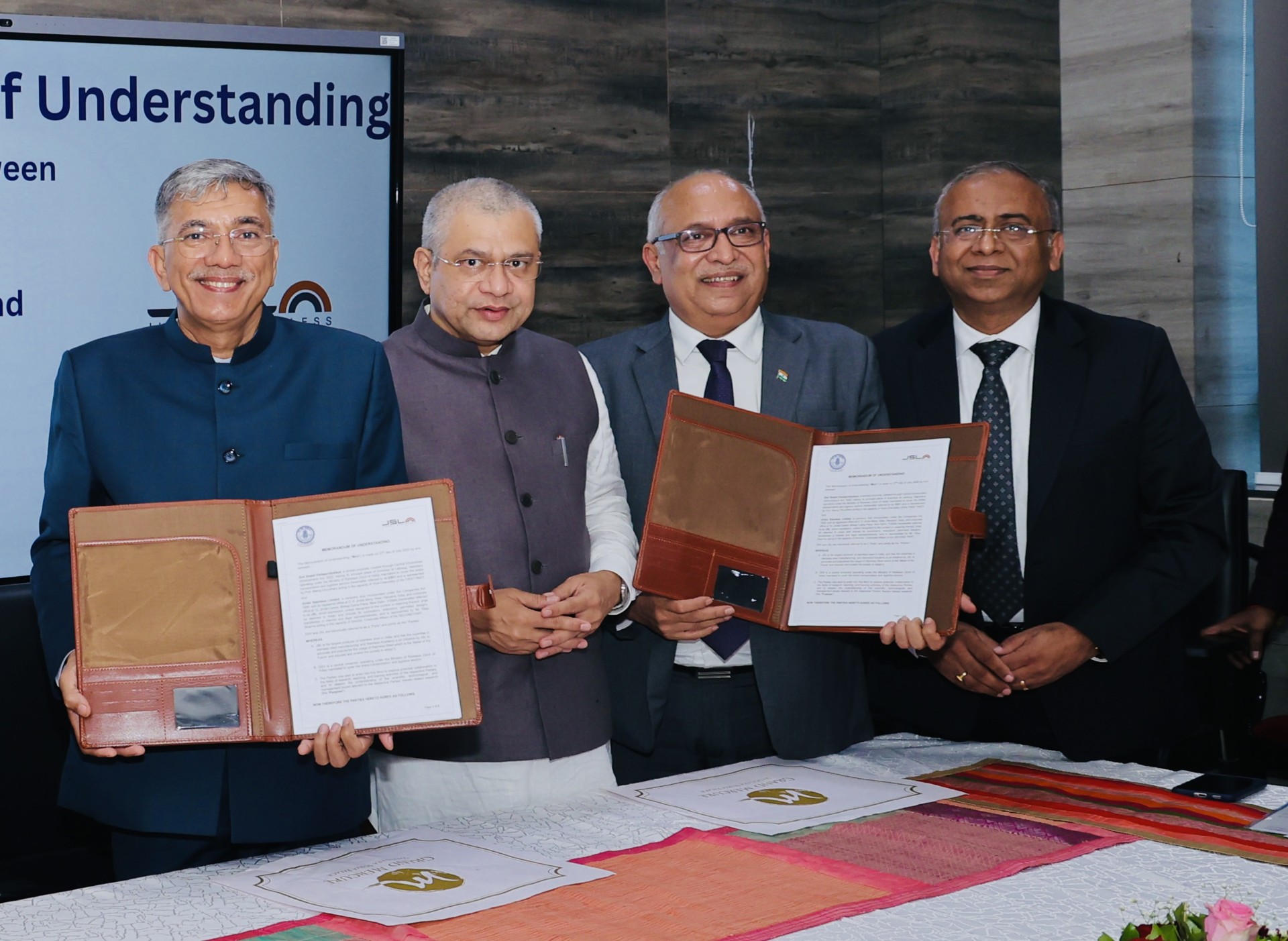Vadodara / Hisar / Bhubaneswar / New Delhi, July 28, 2025: Jindal Stainless Limited (JSL), India’s largest stainless steel manufacturer, has signed a Memorandum of Understanding (MoU) with Gati Shakti Vishwavidyalaya (GSV), Vadodara, a central university operating under the Ministry of Railways (Govt of India) mandated to cover the entire transportation and logistics sector. The MoU was signed at the university campus—on the sidelines of GSV’s 3rd Convocation Ceremony—by Director, Jindal Stainless, Mr Vijay Sharma and Vice-Chancellor, GSV, Prof Manoj Choudhary, in the presence of Hon’ble Minister of Railways, Information & Broadcasting, and Electronics & Information Technology Shri Ashwini Vaishnaw.

(In the picture from left to right: Vice-Chancellor, GSV, Prof Manoj Choudhary; Hon’ble Minister of Railways, I&B and Electronics & IT Shri Ashwini Vaishnaw; and Director, Mr Vijay Sharma & Zonal Head – BD, Mr Pankaj Agarwal, Jindal Stainless)
For Jindal Stainless, this collaboration is part of its broader commitment to develop a self-sustaining ecosystem for stainless steel applications in India. By investing in training and academic partnerships that reinforce the foundational elements of an integrated industry ecosystem, the company is actively strengthening the pipeline of talent and innovation essential for a future-ready stainless steel sector. As per the MoU, Jindal Stainless and GSV, will collaborate in the fields of research, teaching, and training activities pertaining to use of stainless steel in transportation, infrastructure and logistics sector. Both entities will jointly support the development of the academic curriculum as well as the executive programs relevant to the sector. Additionally, they will explore synergies for joint research, partnerships with international institutes, and internship and placement opportunities for GSV students.
Speaking on the collaboration, Managing Director, Jindal Stainless, Mr Abhyuday Jindal, said, “At Jindal Stainless, we believe that education and industry must go hand in hand to shape the India of tomorrow. This collaboration marks a new milestone in our vision to mainstream stainless steel as the most sustainable solution for nation building. Our partnership with Gati Shakti Vishwavidyalaya reinforces our shared mission to build a skilled and future-ready talent, aligned with the country’s industrial ambitions.”
Director, Jindal Stainless, Mr Vijay Sharma, at the MoU signing ceremony, said: “This endeavor marks another important step in our Stainless Academy journey, which is dedicated to creating awareness about the stainless steel industry and developing the skills needed to make a real difference in the sector, from the ground up. By leveraging GSV’s academic excellence and Jindal Stainless’ industry insights, we aim to empower the next generation of workforce to contribute meaningfully to the sustainable growth of the stainless steel industry.”
Vice-Chancellor, GSV, Prof Manoj Choudhary, at the MoU signing ceremony said, “This MoU with Jindal Stainless, a leader in the Stainless Steel manufacturing sector, marks a meaningful milestone in our pursuit of a strong academia-industry collaboration. As a university focused on Transportation and Logistics, we see this partnership as a valuable opportunity to integrate real-world industrial practices into our academic framework. It will equip our students with hands-on exposure, enhance their operational skills, and prepare them to become future-ready professionals.”
This initiative is part of the Jindal Stainless’ Stainless Academy, launched with the vision to strengthen and uplift the stainless steel ecosystem in India. What began as modest effort to train a small group of fabricators has grown into a comprehensive platform focused on driving category awareness, upskilling and building capacity for students and blue-collar workforce, and fostering partnerships for research and innovation. From engaging with academia and future decision-makers to empowering fabricators and industry stakeholders, the Academy – through its various programs such as Fabricators Training Program and Qualification Pack based training programs – catalyzes sectoral growth, while also generating employment and livelihood opportunities for youth and fabricators alike, thus transforming the stainless steel ecosystem in a holistic and sustainable way.
With stainless steel gaining prominence across sectors due to its corrosion-resistance, longevity, recyclability, and low lifecycle cost, this partnership is expected to pave the way for transformative industry-academia synergies.
About Gati Shakti Vishwavidyalaya (GSV):
A central university under the Ministry of Railways, GSV is dedicated to creating a world-class talent pool for India’s transportation and logistics sectors. It focuses on multidisciplinary education, research, and training to serve the dynamic needs of infrastructure and mobility in the country.
About Jindal Stainless:
India’s leading stainless steel manufacturer, Jindal Stainless, had an annual turnover of INR 40,182 crore (USD 4.75 billion) in FY25 and is ramping up its facilities to reach 4.2 million tones of annual melt capacity in FY27. It has 16 stainless steel manufacturing and processing facilities in India and abroad, including in Spain and Indonesia, and a worldwide network in 12 countries, as of March 2025. In India, there are ten sales offices and six service centers, as of March 2025. The company’s product range includes stainless steel slabs, blooms, coils, plates, sheets, precision strips, wire rods, rebars, blade steel, and coin blanks.
Jindal Stainless relies on its integrated operations to enhance its cost competitiveness and operational efficiency. Founded in 1970, Jindal Stainless continues to be inspired by a vision for innovation and enriching lives and is committed to social responsibility.
Jindal Stainless remains focused on a greener and sustainable future. The company manufactures stainless steel using electric arc furnace, a process that significantly reduces greenhouse gas emissions and allows for the recyclability of scrap without compromising on quality.